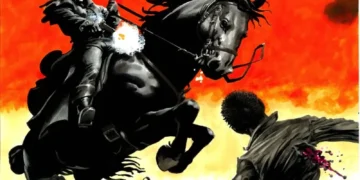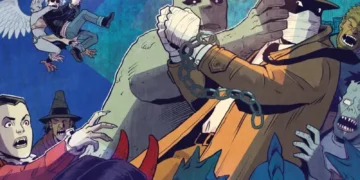Cast: Robbie Williams, Jonno Davies, Steve Pemberton, Damon Herriman, Raechelle Banno, Alison Steadman
Genre: Docudrama, Biography, Fantasy, Musical
Director: Michael Gracey
In Irish Cinemas: 26th December 2024
Most music biopics are devoted to extolling their subjects’ genius or revolutionary artistry, presenting them as cultural icons who redefined their craft. However, what sets Better Man apart is its disarmingly honest portrayal of Robbie Williams, one of the UK’s biggest pop stars. Rather than mythologising his rise to fame, the film refreshingly embraces Williams’ candid admission: his primary motivation wasn’t artistic excellence but a relentless desire to be famous. This raw honesty lends Better Man a unique perspective, reframing Williams’ story and the biopic genre. By peeling back the layers of artistic pretence, the film instead shines a spotlight on the insecurities and deep-seated need for validation that drive many performers.
Directed by Michael Gracey, the film challenges biopic conventions further. In a bold creative choice, Gracey casts Jonno Davies to portray Williams, only to transform the singer into a monkey using special effects. This audacious decision underscores the film’s willingness to push boundaries, offering a symbolic, surreal representation of Williams’ self-perception and the animalistic hunger for fame that often defines the entertainment industry. The result is a profoundly entertaining yet unexpectedly moving exploration of stardom and its discontents.

Better Man, which premiered to acclaim at the Telluride and Toronto film festivals, is set to hit Irish cinemas this St. Stephen’s Day. The film celebrates Robbie Williams, the British pop sensation who turned 50 earlier this year. While Williams has long been a dominant force in Europe, his success in North America has been more muted—a gap that Netflix’s recent four-part documentary on the singer, released in 2023, may have helped to bridge.

Even those unfamiliar with Williams’ chart-topping solo hits or his earlier days as a member of the iconic 1990s boy band Take That are likely to find Better Man an engaging watch. Director Michael Gracey, best known for helming The Greatest Showman, brings his signature flair to the project. The film bursts with lively musical numbers and a dynamic narrative structure, capturing both the theatricality of Williams’ stage persona and the emotional highs and lows of his journey. Much like the title of Gracey’s earlier hit, The Greatest Showman could easily describe Williams himself—a performer who has always thrived on delivering unforgettable entertainment.

Focusing on Robbie Williams’ life up to 2001, Better Man takes a bold and unconventional approach by presenting the pop star as a CGI monkey, with Jonno Davies embodying the role. This imaginative concept stems from director Michael Gracey’s conversations with Williams, during which the singer repeatedly described himself as feeling like a “performing monkey” — a self-deprecating exaggeration that Gracey interprets literally. The visual metaphor poignantly illustrates Williams’ feelings of awkwardness and inadequacy, portraying him as an odd, misfit creature who believes he is ugly and out of place compared to those around him.

Despite these insecurities, Williams is driven by his entertainer father, Peter (Steve Pemberton), who abandoned the family when Williams was still a boy. Encouraged by Peter’s influence and his hunger for stardom, the young Williams auditions for the boy band Take That at just 15, quickly becoming a heartthrob for legions of fans. However, fame proves to be a double-edged sword. While Williams revels in the spotlight, his struggle with drugs and alcohol begins to consume him, ultimately leading to his departure from the group and forcing him to redefine himself as a solo artist.
Gracey’s depiction of Williams is both cheeky and layered. Early in the film, someone dismisses the teenage singer as a “cheeky little bastard,” but this mischievous spirit becomes the essence of his charm. A devoted admirer of Frank Sinatra, who his father also loved, Williams dreams not of artistic greatness but of dazzling audiences as the ultimate entertainer. He craves attention, fame, and financial success —the film neither romanticises nor condemns aspirations. Instead, Better Man embraces Williams’ unapologetic desire for the spotlight, presenting it as a valid and profoundly human motivation. Gracey suggests that authenticity, even in a brash or “shallow” form, is the true hallmark of a successful artist.

Jonno Davies delivers a charismatic and swaggering performance that avoids the common biopic trap of overly imitating the real-life subject. The decision to use CGI, initially surprising, proves to be an inspired choice, as it vividly conveys Williams’ inner turmoil. His digital visage captures a raw sense of self-loathing, making his struggles and triumphs feel visceral. No matter how successful he becomes, the monkey-like image reflects Williams’ perception of himself as an outcast, underscoring the emotional weight of his journey.
That said, Better Man doesn’t entirely escape the conventions of the biopic genre. The depiction of Williams’ descent into substance abuse is predictably harrowing, and his romantic missteps feel more mundane than revelatory. Yet, within this familiar framework, Gracey finds fresh ways to celebrate Williams’ unique ability to captivate and entertain. The musical set pieces are the film’s standout moments, transforming Williams’ songs into grand theatrical experiences. For instance, Take That’s meteoric rise is set to Williams’ later solo hit “Rock DJ,” with an entire city as a backdrop for an electrifying dance sequence. Gracey’s flair for emotional spectacle, reminiscent of his work on The Greatest Showman, takes centre stage in these moments. Numbers like “Angels” are elevated by expressive camerawork and choreography that amplify their emotional resonance.

While none of Williams’ songs are incredibly profound, Better Man argues that their simplicity doesn’t diminish their power. The film adopts a generous, open-hearted perspective, balancing snarky humour with genuine emotion. Thoughtful but never heavy-handed, it captures the essence of Williams’ appeal: an artist who, despite his insecurities, is determined to entertain. As one of his signature hits declares, “Let Me Entertain You,” and Better Man wholeheartedly delivers on that promise, all while keeping the vulnerable performer at its core firmly in view.
Overall: 7/10


















